新概念英语第一册第31-32课:Where's Sally
- 格式:docx
- 大小:18.85 KB
- 文档页数:9
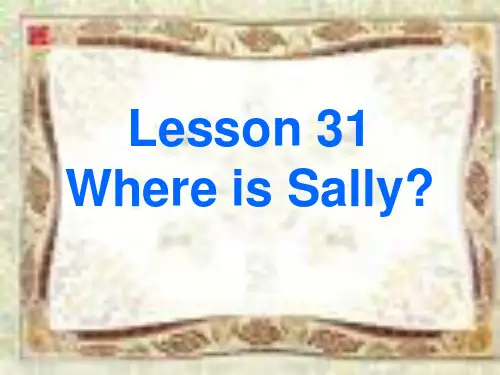
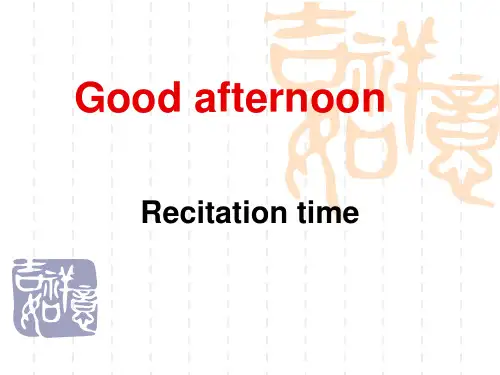
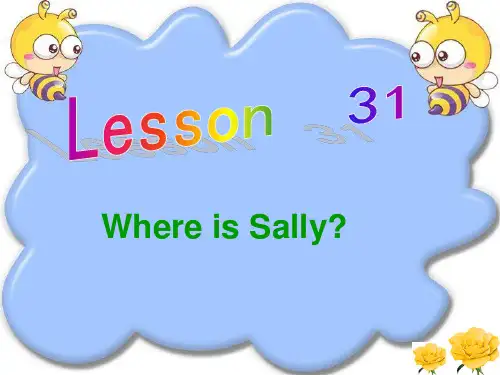
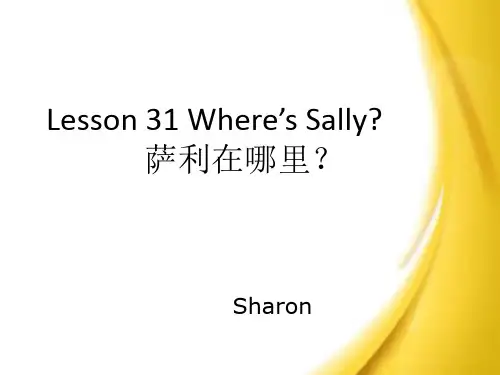
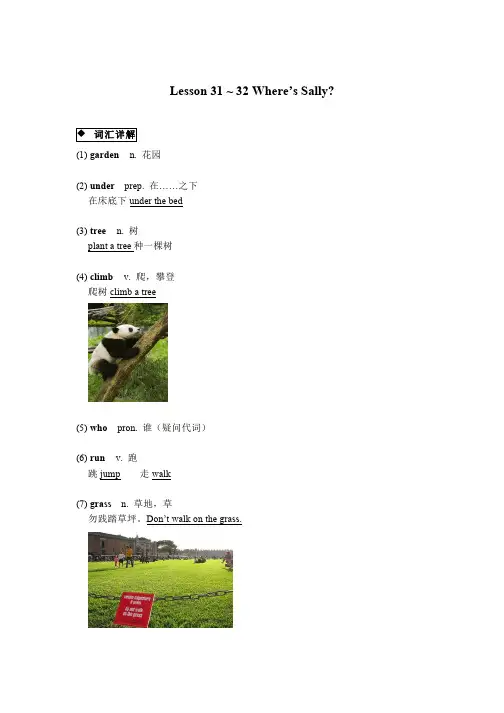
Lesson 31 ~ 32 Where’s Sally?!词汇详解(1) garden n. 花园(2) under prep. 在……之下在床底下under the bed(3) tree n. 树plant a tree种一棵树(4) climb v. 爬,攀登爬树climb a tree(5) who pron. 谁(疑问代词)(6) run v. 跑跳jump 走walk(7) grass n. 草地,草勿践踏草坪。
Don’t walk on the grass.(8) after prep. 在……之后(可以表示“方位”和“时间”)方位:Shut the door after you. 随手关门时间:后天the day after tomorrow(9) across prep. 横过,穿过游过河swim across the river(10) cat n. 猫猜一猜:rain cats and dogs下倾盆大雨(11) type v. 打字(12) letter n. 信打一份信type a letter(13) basket n. 篮子(14) eat v. 吃猜猜词义:eat like a horse吃得多,饭量大(15) bone n. 骨头(16) clean v. 清洗clean adj. 干净的(17) tooth n. 牙齿复数teeth(18) cook v. 做(饭菜)(19) milk n. 牛奶milk pudding牛奶布丁(20) meal n. 饭,一顿饭meal 包括breakfast; lunch; dinner/supper烧饭cook a meal(21) drink v. 喝喝咖啡drink coffee喝一杯牛奶drink a bottle of milk(22) tap n.(水)龙头(英式英语)!重点语法(1) 现在进行时I"课文原句重现:She is sitting under the tree.He is climbing the tree. 等"结构:主语+ am/is/are + doing"用法:表达此刻正在进行的动作"如何变成-ing形式?1. 大多数动词直接加ing例如:do--doing, climb--climbing。
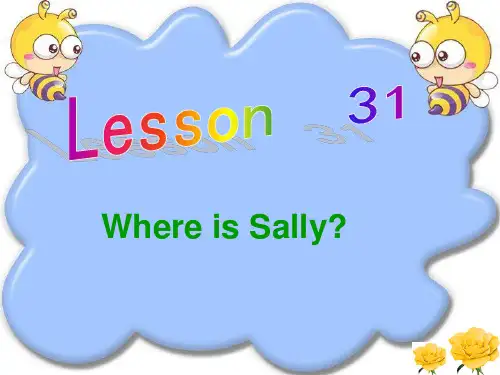
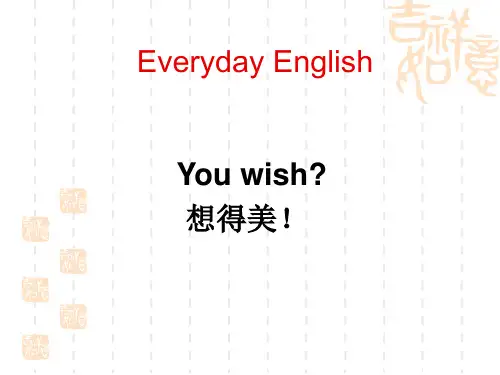
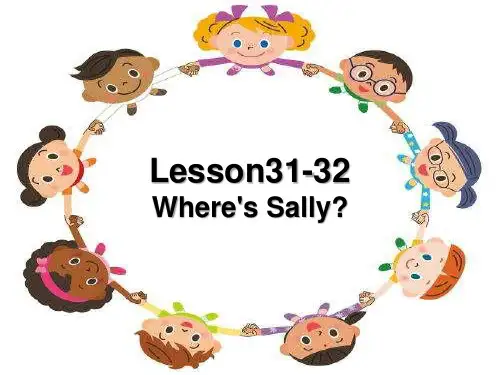

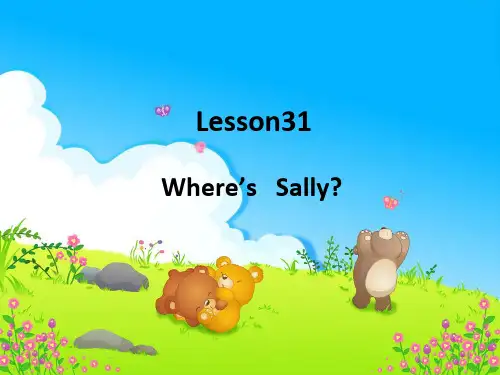
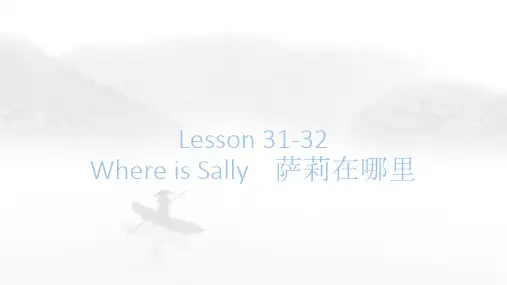
Lesson 31 Where's Sally?萨莉在哪里?
Listen to the tape then answer this question.Is the cat climbing the tree?
听录音,然后回答问题。
猫正在爬树吗?
Where’s Sally, Jack?
简:杰克,萨莉在哪儿?
She’s in the garden, Jane.
杰克:她在花园里,简。
What’s she doing?
简:她在干什么?
She’s sitting under the tree.
杰克:她正在树荫下坐着。
Is Tim in the garden, too?
简:蒂姆也在花园里吗?
Yes, he is.
He’s climbing the tree.
杰克:是的,他也在花园里。
他正在爬树。
I beg your pardon?Who’s climbing the tree.
简:你说什么?谁在爬树?
Tim is.
杰克:蒂姆在爬树。
What about the dog?
简:那么狗呢?
The dog’s in the garden, too.It’s running across the grass.It’s running after a cat.
杰克:狗也在花园里。
它正在草地上跑,在追一只猫。
New Word and expressions 生词和短语
garden
n. 花园
under
prep.在……这下
n. 树
climb
v. 爬,攀登
who
pron.谁
run
v. 跑
grass
n. 草,草地
after
prep.在……之后
across prep.横过,穿过
cat
Notes on the text课文注释
1 在英文中表示说话时正在进行的动作或事件,要用动词的现在进行时。
现在进行时由be的现在时加上现在分词组成,如课文中的“She's sitting under the tree.”和“He's climbing the tree.”等句子均为现在进行时。
对大多数动词来说,在动词后面直接加-ing即可组成现在分词,如doing. climbing。
对以-e结尾的动词,要去掉-e,再加-ing,如making。
如果动词只有一个元音字母,而其后跟了一个辅音字母时,则需将辅音字母双写,再加-ing,如running, sitting。
2 What about the dog?那么狗呢:这句话的意思是What is the dog doing in the garden?为了避冤重复原句中的主语和谓语动词,可以用What about这个结构,用来询问情况。
3 run after,追逐。
例:Look, Sally is running after her Mum.瞧,萨莉正在追赶她的母亲。
Lesson 32 What's he/she/it doing?他/她/它正在做什么?
New Word and expressions 生词和短语
type
v.打字
n.信
basket
n.篮子
eat
v.吃
bone
n.骨头
clean
v.清洗
tooth
复数(teeth) n.牙齿
cook
v.做(饭菜)
n.牛奶
meal
n.饭,一顿饭
drink
v.喝
tap
n.(水)龙头
Lesson 31-32 自学导读First things first
课文详注Further notes on the text
1 Where’s = Where is。
2 She' s sitting under the tree.她正在树阴下坐着。
句中is sitting是现在进行时结构,这里是表示现在正在进行的动作。
请参见本课语法部分。
3 What about the dog?那么狗呢?
这句话的意思是:What is the dog doing in the garden?为了避免重复原句中的主语和谓语动词,可以用What about. . .?这个结构,用来询问情况。
What about...?(…怎么样?)是英语口语中较常用的一个句式,也可以说How
about...?about一词后面可跟人,也可跟物。
通常在对话中,有上下文情况时使用,用于询问情况或征求别人意见。
4 run across 跑着穿过。
5 数字200,000与1,000,000的英文写法
200,000 - two hundred thousand
1,000,000 - one million
词汇学习Word study
1.climb v.
(1)攀登,攀爬:
The children are always climbing trees.
孩子们总是在爬树。
He likes climbing mountains.
他喜欢爬山。
(2)逐步上升(增长):
The temperature is climbing steadily.
温度正在慢慢地平稳上升。
The price of gold climbed back.
金价逐渐回升了。
(3)(在社会地位等方面)往上爬:
He is trying hard to climb to the top of the social ladder.
他正努力爬到社会的最顶层。
He has climbed to a very high position in his field.
他已在自己的领域中爬到了一个很高的位置。
2.run v.
(1)跑,奔跑:
He is running quickly.
他正飞快地跑着。
He runs a mile every morning to keep fit.
他每天早晨跑一英里步以保持身体健康。
(2)流动;流出:
The current is running strong.
水流湍急。
Her eyes ran with tears.
她落泪了。
(3)追赶;追逐:
The dog is running after a cat.
那只狗正在追赶一只猫。
Many young men are running after that girl.
许多年轻人在追求那个姑娘。
语法Grammar in use
现在进行时(1)
(1)在英文中若想表达此刻正在进行的动作或事件,要用动词的现在进行
时形式。
现在进行时由be的现在时形式(am, is, are)+现在分词组成。
如课文中的Shes sitting under the tree 和Hes climbing the tree等句子均为现在进行时。
对大多数动词来说,在动词后面直接加-ing即可构成现在分词,如doing, climbing。
以-e结尾的动词,要去掉-e,再加-ing,如making。
如果动词只有一个元音字母而其后跟了一个辅音字母时,则需将与辅音字母双写,再加-ing,如running, sitting。
(2)疑问式:将用了现在进行时的句子变成一般疑问句时只需将助动词提前。
如:
Hes reading a magazine.
他正在看一本杂志
Is he reading a magazine?
他正在看一本杂志吗?
(3)否定式:现在进行时的否定式是将否定词not放在助动词之后。
如:The dog is drinking its milk.
狗正在喝它的那份牛奶
The dog is not drinking its milk.
狗没在喝它的那份牛奶。